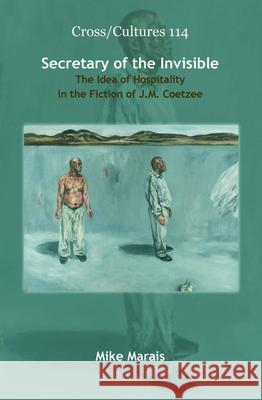Secretary of the Invisible : The Idea of Hospitality in the Fiction of J.M. Coetzee » książka
Secretary of the Invisible : The Idea of Hospitality in the Fiction of J.M. Coetzee
ISBN-13: 9789042027121 / Angielski / Twarda / 2009 / 249 str.
Secretary of the Invisible : The Idea of Hospitality in the Fiction of J.M. Coetzee
ISBN-13: 9789042027121 / Angielski / Twarda / 2009 / 249 str.
(netto: 316,41 VAT: 5%)
Najniższa cena z 30 dni: 332,23 zł
ok. 30 dni roboczych
Bez gwarancji dostawy przed świętami
Darmowa dostawa!
How do individuals, who are part of a community, respond to the stranger as a stranger: i.e. without simply positioning this outsider in opposition to the community in which they are located? How may individuals receive something unknown and therefore surprising into their world without compromising it by identifying it in the terms of that world? In this study, Mike Marais traces the various ways in which Coetzee's fiction, from Dusklands through to Slow Man, repeatedly poses such questions of hospitality. It is shown that the form of ethical action staged in Coetzee's writing is grounded not in the individual's willed and rational achievement, but in his or her invasion and possession by the strangeness of the stranger. This ethic of hospitality, Marais argues, has a strong aesthetic dimension: for Coetzee, the writer is inspired to write by being acted upon by a force from beyond the phenomenal world. The writer is a secretary of the invisible. She or he is responsible to and for the invisible. Marais maintains that this understanding of writing as an involuntary response to that which exceeds history is evident from the first in Coetzee's fiction. In readings of the novels of the apartheid era, he traces this writer's rueful, ironic awareness of the limited, even incidental, form of political engagement that may emanate from such an aesthetic. He then goes on to argue that if it is the writer's obligation to render visible the invisible, writing must be a task that can never be completed. What is more, such writing is thus bound to be iterative in form. With this in mind, he traces the structural similarities between Coetzee's writing of the apartheid period and his post-apartheid and Australian writing, arguing that the later texts are self-reflexively aware of their endlessly repetitive nature. These contentions are developed incrementally through close readings of the individual novels that focus on recurring metaphors of hospitality - visitor, the stranger, the house, the castaway, the invisible, the dream, and the child.











